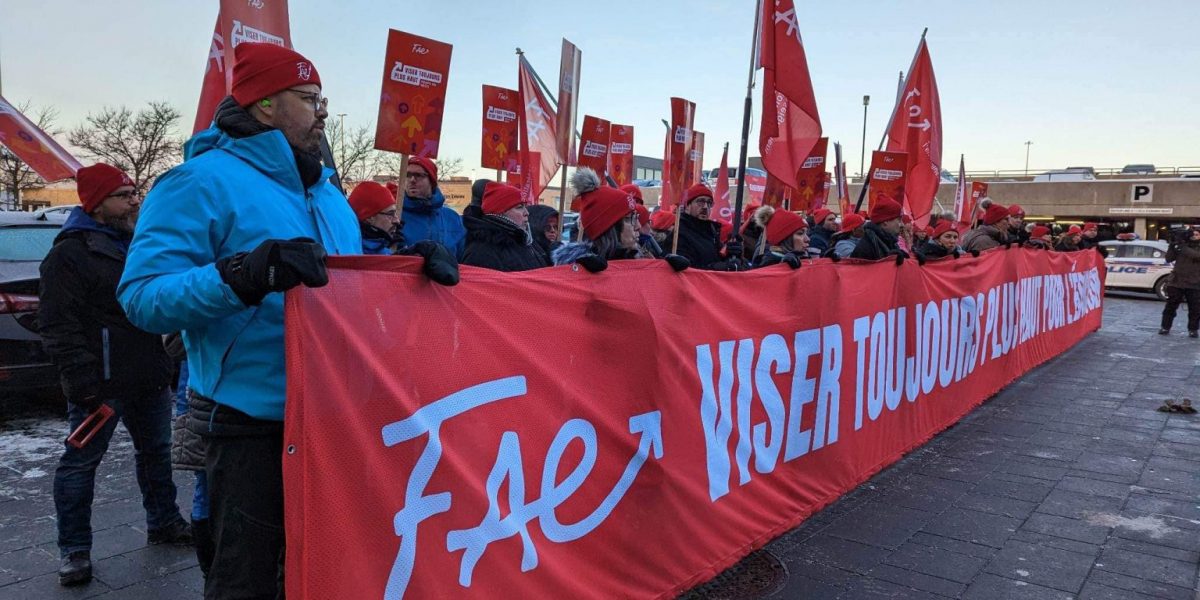Nine unions affiliated with the Fédération autonome de l’enseignement (FAE), representing 65,500 elementary and secondary school teachers in Quebec have voted in favour of unlimited strike action. The vote won with over 90 percent approval. This stands in stark contrast to the Ontario Secondary School Teachers Federation in Ontario (OSSTF) who voted to enter into binding arbitration.
Quebec teachers flexing their muscle
The FAE is not part of the province’s Common Front of public sector unions, whose members also voted 90 percent in favour of walkouts if necessary. The FAE is negotiating its contract separately with the provincial government and therefore the unlimited strike mandate doesn’t include preliminary work actions by the Common Front, such as one-day strikes.
The teachers have to be feeling their power, as the Quebec school year started with a shortage of 8,000 teachers. To deal with the shortage, the province has been hiring unqualified adults to supervise classes. The huge labour shortage in Quebec is but one example of a problem across the country. Relatively worsening pay levels and more difficult working conditions are combining to create a teacher shortage in every province.
The answer is to reverse those trends of worsening pay and working conditions and this vote by teachers in Quebec is a powerful move to do just that. As FAE president Mélanie Hubert said, “The membership is determined to improve their working conditions. There is no intention this time to engage in half-measures. [The membership] is telling us ‘if we walk out, we walk out for good.’”
OSSTF chooses compromise
Contrast this with the OSSTF approach of the, who voted this week 78.4 percent in favour of a binding arbitration process that will ensure there is no strike. This is a tale of two different bargaining approaches: class struggle versus class snuggle. After more than a year of secretive negotiations with the Ontario government, the OSSTF leadership advocated binding arbitration to its members. A process that means negotiations will be out of the members hands and they will have no say over “unresolved issues handed over to a third-party arbitrator.”
This approach and the super low turnout for the arbitration vote (reports seem to indicate that less than 30 percent of members voted) reflect demoralization about what can be achieved and a resignation to just get a decent wage increase and a remedy to lost wages under Bill 124, while not touching the actual working and learning conditions in school.
Ontario Education Minister, Stephen Lecce is gloating about the deal and encouraging other unions to follow suit. Why? OSSTF and others who advocated for the binding arbitration approach are convinced that it will ensure more favourable outcomes for teachers. Why then is the Education Minister so anxious to get everyone in the sector to agree to binding arbitration?
Thankfully, the Elementary, Catholic and French Teachers unions have signed a joint statement stating that “entering into binding arbitration at this juncture would not support the students we serve in elementary and secondary schools – as binding arbitration would all but guarantee that the key issues we have brought forward at our respective bargaining tables, which are critical to learning and working conditions in our schools, would not be addressed. Furthermore, the decision to enter into binding arbitration now impacts the opportunity for meaningful local bargaining on key local issues.”
Quebec teachers are showing the way. Their strong strike vote shows the union is organized and willing to fight for what their members need. Whatever the outcome, the process of preparing the strike has made their union stronger and created much more favourable conditions to fight for a stronger public education system for all. The OSSTF on the other hand has chosen a path that demobilizes its members, undercuts other education unions, and strengthens the hand of the Ford government.
Teachers’ bargaining in Quebec and Ontario is a good reminder that when you fight, you don’t always win everything. But when you choose to not fight, you can never win.
Anyone interested in being part of a network to take these next steps should contact Larry at: rankandfileteacherON@gmail.com.
Did you like this article? Help us produce more like it by donating $1, $2, or $5. Donate

